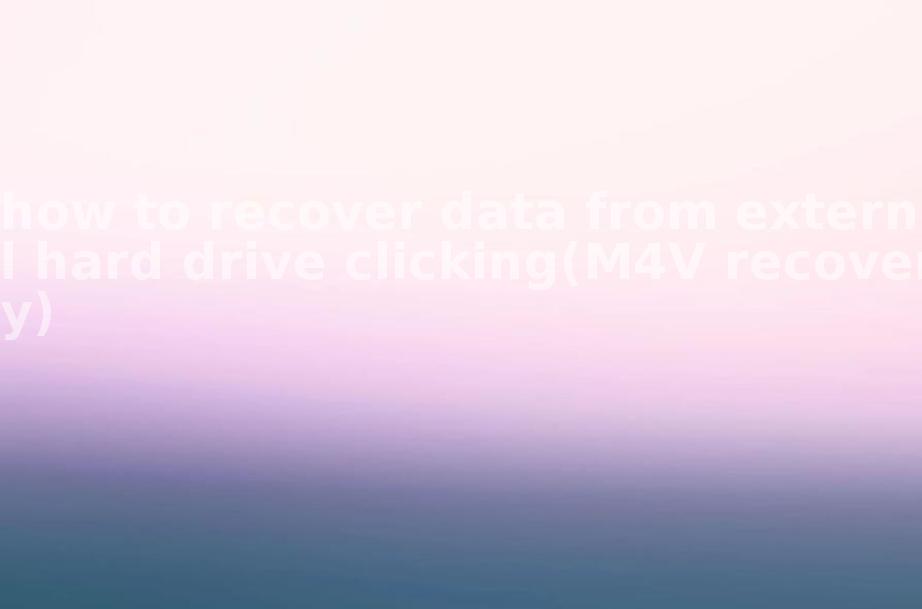how to recover data from external hard drive clicking(M4V recovery)
2023-10-20 23:00 303
Part I. Overview of the context in which the document was recovered:
Recovering data from an external hard drive that is clicking can be a challenging task. A clicking sound usually indicates physical damage to the hard drive's internal components. This can be caused by various reasons such as a drop or impact, overheating, power surges, or manufacturing defects. When a hard drive clicks, it signifies that the read/write heads are struggling to function properly, which makes data recovery difficult.
Example 1: John accidentally dropped his external hard drive while it was running. After connecting it to his computer, he noticed a clicking sound coming from the drive, and it was not being recognized by the system.
Example 2: Sarah's external hard drive started clicking after a power surge during a thunderstorm. She immediately unplugged it, but when she connected it again, the clicking sound persisted, and the drive couldn't be accessed.

Part II. Causes of clicking and data loss:

1. Physical damage: Dropping the external hard drive or exposing it to physical trauma can lead to misalignment or damage to the read/write heads or platters. 2. Electrical issues: Power surges or fluctuations can damage the circuitry of the hard drive, causing it to malfunction and produce clicking sounds. 3. Overheating: Continuous and prolonged use of the external hard drive without proper cooling can lead to overheating, which can damage the internal components and result in clicking noises. 4. Manufacturing defects: Some external hard drives may have design or manufacturing flaws that can cause clicking and eventual data loss.
Part III. Solution steps for data recovery:
1. Stop using the drive: Continuing to use the clicking external hard drive can further damage the internal components. It is crucial to disconnect it from power and avoid any attempts to access the data. 2. Consult data recovery professionals: Clicking external hard drives require special expertise and equipment for data recovery. It is recommended to contact professional data recovery services who specialize in handling such cases. 3. Repair or replace the hard drive: Depending on the severity of the damage, data recovery professionals can either repair the hard drive or replace the faulty components to retrieve the data. 4. Data extraction and recovery: Once the clicking external hard drive is repaired or replaced, the data recovery specialists will use specialized software and techniques to extract and recover the lost data.
Part IV. Types of other files that can be recovered:
Apart from M4V files, data recovery from a clicking external hard drive can include various types of files such as:
1. Documents: Word files, PDFs, spreadsheets, and presentations. 2. Photos: JPEGs, PNGs, RAW image files, and more. 3. Videos: AVI, MP4, MOV, and other video formats. 4. Audio: MP3s, WAVs, and other audio files. 5. Archives: ZIP files, RAR files, and other compressed file formats. 6. Emails: Recovery of mailbox files and email attachments.
Part V. Related FAQs:
1. Can I recover the data from a clicking external hard drive on my own? Recovering data from a clicking external hard drive requires specialized knowledge and equipment. It is recommended to consult professional data recovery services for the best chances of successful recovery.
2. How much does professional data recovery cost for a clicking external hard drive? The cost of data recovery depends on various factors such as the severity of the damage, the size of the drive, and the complexity of the recovery process. It is best to inquire with data recovery professionals for an accurate quote.
3. Is there any way to prevent data loss from a clicking external hard drive? Regularly backing up your data to multiple locations, handling the hard drive with care, and protecting it from power surges can help minimize the risk of data loss. However, physical damage can still occur, so it is important to be prepared with backups and professional data recovery services if needed.









